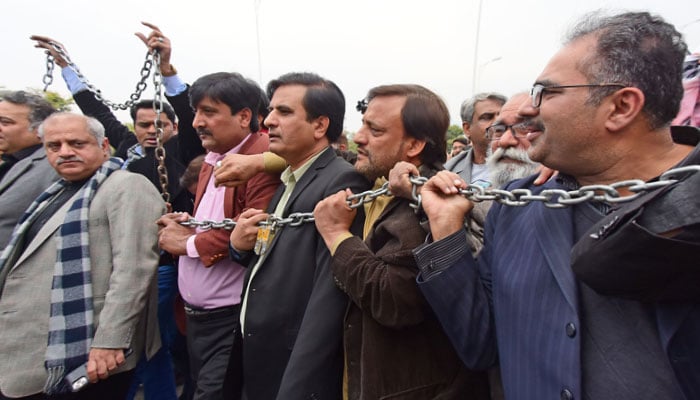Journalists, activists rally against Peca amendment
“There needs to be proper consultation process, complete with drafts shared that are then discussed," says Azhar Abbas
KARACHI: Journalists and digital rights activists across Pakistan have fiercely condemned the Prevention of Electronic Crimes (Peca) (Amendment) Bill 2025, with protests erupting nationwide on Tuesday after the amendment law was passed by the Senate amid significant backlash. Journalists led the charge in cities like Islamabad, Karachi and Lahore, vowing to continue their fight against what they deem a draconian law.
The amendments, which the government claims aim to combat misinformation and fake news on social media, have been panned by media workers and civil society, who argue that the law lacks clarity and threatens press freedom.
Journalists and digital rights activists have also spoken out about the government missing the important step of consulting with stakeholders while framing and introducing the Prevention of Electronic Crimes (Peca) (Amendment) Act 2025.
Co-founder of the digital rights advocacy organisation, Bolo Bhi, Farieha Aziz tells The News that: “There was absolutely no consultation process, especially with digital rights groups. And those that did reach out to [the government] received no response. No draft was shared at all. The process has been non-transparent and non-consultative and the way it has been bulldozed through the National Assembly and the Senate is hugely problematic.”
“There needs to be a proper consultation process, complete with drafts shared that are then discussed. In the case of both the Punjab defamation law and the current Peca amendments, we had asked the government to delay the bills and start a consultation process. In the current Peca amendments’ case, they hardly gave a day [to journalists/media bodies] to respond with any suggestions”, says President of the Association of Electronic Media Editors and News Directors (AEMEND) Azhar Abbas.
He says that at least during its tenure the PTI government had “agreed to a consultation process and drafts were exchanged. Though in the end they too tried to hurriedly pass the legislation”, adding that even during Marriyam Aurangzeb’s tenure as minister of information when the government had tried to bring a change in the Pemra law after drafts etc were demanded the government did agree on some definitions.
But this time, says Abbas, the government “gave us an hour to come up with the suggestions before [the amendment bill] was passed in the National Assembly. For the Senate, they gave us a day due to the protest calls and strong reaction from the media bodies.”
The AEMEND president ends with the reminder that “the very political parties that want to enact such laws have suffered due to such laws in the past. Unfortunately, they are still very shortsighted and are enacting laws that will also hurt them in the future.”
Meanwhile, Tuesday saw wide-scale protests by journalists and journalists’ bodies across the country. In Islamabad, members of the Pakistan Federal Union of Journalists (PFUJ), lawyers and civil society gathered outside the National Press Club to denounce the legislation. Protesters, led by PFUJ President Afzal Butt and NPC President Azhar Jatoi, marched towards D-Chowk, chanting slogans against the Peca amendments. Many wore chains as a symbol of their struggle for press freedom.
The protest escalated into a sit-in at D-Chowk, where PFUJ leaders vowed to continue resisting any attempts to curtail free expression. Tensions rose as police deployed heavy contingents and barbed wire to block the protesters’ movement.
In Lahore, a demonstration outside the Lahore Press Club saw participation from opposition leaders, including the PTI’s Malik Ahmad Khan Bhachar and Jamaat-e-Islami’s Qaiser Sharif. Bhachar accused the government of bypassing stakeholders in the legislative process, calling the Peca amendments a blow to democracy.
Karachi also witnessed significant protests, with senior journalist Mazhar Abbas addressing demonstrators outside the Karachi Press Club. Abbas termed the amendments an attack on freedom of expression, saying, “This is the beginning of a historical struggle against a civilian martial law.” He criticised the lack of consultation with journalists and warned against attempts to control the media.
The Karachi Union of Journalists’ (KUJ) Imtiaz Khan Faran and Tahir Hassan Khan condemned the amendment law as unacceptable, while the PBA’s Qazi Ather vowed to defend press freedom. The PFUJ’s Khurshed Abbasi expressed concern over rushed legislation, and Lala Asad announced a planned long march to Islamabad against such oppressive laws.
Journalists have also been posting on their social media accounts to mark their condemnation of what they say is a black law. Shahzad Iqbal, the host of Geo News’ ‘Naya Pakistan’ show, shared a post on X by the Anchors Association of Pakistan: “Working journalists reject Pakistan’s government’s present move to silence freedom of speech via controversial Peca Act. When governments silence voices, they silence democracy itself. Pakistan must uphold the right to dissent.
The PFUJ has vowed to escalate its protests, with plans for hunger strikes and rallies until the law is repealed.
The Balochistan Union of Journalists (BUJ) has also rejected the Peca amendment law, demanding its withdrawal. A protest organised by the BUJ in Quetta on Tuesday, in response to the call by the PFUJ, drew journalists, civil society members, labour leaders and newspaper vendors.
PFUJ Vice President Saleem Shahid criticised the government for attempting to suppress press freedom and public access to information, calling the bill a direct attack on democratic freedoms. He also condemned the lack of consultation with journalist organisations during the bill’s drafting.
Journalists in Multan and southern Punjab also observed a black day in protest against the Peca amendments being approved by parliament. Protests led by the Multan Union of Journalists President Rauf Maan and General Secretary Javed Iqbal Amber condemned the Senate’s approval of the bill, calling it a dark day in Pakistan’s parliamentary history.
Demonstrations were held across various districts, including Dera Ghazi, Muzaffargarh, Bahawalpur and Rahim Yar Khan, with journalists expressing concerns over the law’s excessive powers, threats to media freedom, cyber defamation risks, and violation of fundamental rights. The Bahawalpur Union of Journalists, led by General Secretary Rashid Aziz Hashmi, also condemned the amendments as an attempt to suppress independent voices and undermine democracy.
The Forum for Digital Rights and Democracy (FDRD) has also criticised the rushed enactment of the Peca amendment law, warning that the law poses serious threats to citizens’ fundamental rights and undermines principles of transparency, inclusivity, and accountability vital for democratic governance. Addressing a press conference on Tuesday, the JI’s Hafiz Naeem-ur-Rehman also rejected the Peca law and called it an attack on freedom of expression and a government tactic to suppress the voice of the people, assuring journalists that the JI stands with them against this law.
-
 King Hospitalized In Spain, Royal Family Confirms
King Hospitalized In Spain, Royal Family Confirms -
 Japan Launches AI Robot Monk To Offer Spiritual Guidance
Japan Launches AI Robot Monk To Offer Spiritual Guidance -
 Japan Plans Missile Deployment Near Taiwan By 2031 Amid Growing Regional Tensions
Japan Plans Missile Deployment Near Taiwan By 2031 Amid Growing Regional Tensions -
 Meghan Markle, Prince Harry Spark Reactions With Latest Announcement
Meghan Markle, Prince Harry Spark Reactions With Latest Announcement -
 Kate Hudson Reflects On Handling Award Season With No Expectations
Kate Hudson Reflects On Handling Award Season With No Expectations -
 6 Celebrities Who Have Been Vocal About Anxiety And 'panic Attacks'
6 Celebrities Who Have Been Vocal About Anxiety And 'panic Attacks' -
 Is This The Future Of Train Travel? Robot Dogs, Drones Are Redefining Public Transit Safety Through China’s New Metro Station Deployment
Is This The Future Of Train Travel? Robot Dogs, Drones Are Redefining Public Transit Safety Through China’s New Metro Station Deployment -
 Sarah Ferguson Seeks Hollywood Backing As Epstein Files Resurface
Sarah Ferguson Seeks Hollywood Backing As Epstein Files Resurface -
 China’s AI Milestone: ByteDance’s Doubao Chatbot Hits 100M Users During Lunar New Year
China’s AI Milestone: ByteDance’s Doubao Chatbot Hits 100M Users During Lunar New Year -
 Think You Know ChatGPT? Here Are 5 AI Levels You’ve Never Seen
Think You Know ChatGPT? Here Are 5 AI Levels You’ve Never Seen -
 Bitcoin Bounces From $62,000 As On-chain Metrics Signal Prolonged Weakness: Here Is Everything To Know
Bitcoin Bounces From $62,000 As On-chain Metrics Signal Prolonged Weakness: Here Is Everything To Know -
 Elon Musk Teases Official Grok CLI For Developers As AI Rivalry With Anthropic Heats Up
Elon Musk Teases Official Grok CLI For Developers As AI Rivalry With Anthropic Heats Up -
 Jennifer Aniston Ready To Walk Down The Aisle Again?
Jennifer Aniston Ready To Walk Down The Aisle Again? -
 Sarah Ferguson’s Plan Now That Andrew Is Thrown Into The Fire: ‘She’s Not Certain She’ll Come Out The Other Side’
Sarah Ferguson’s Plan Now That Andrew Is Thrown Into The Fire: ‘She’s Not Certain She’ll Come Out The Other Side’ -
 ‘The AI Doc’: What AI Leaders Told Daniel Roher Will Keep You Up At Night
‘The AI Doc’: What AI Leaders Told Daniel Roher Will Keep You Up At Night -
 Sarah Ferguson In Hiding As Arrest Fears Grow After Andrew Was Taken Into Custody
Sarah Ferguson In Hiding As Arrest Fears Grow After Andrew Was Taken Into Custody




